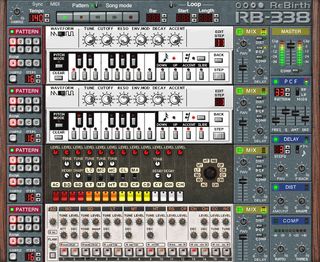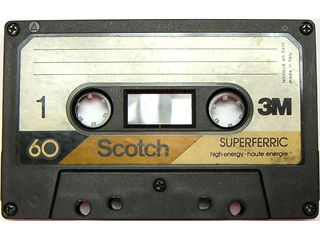Many of us strive to make our music sound as 'perfect' and pristine as possible, but top-quality production values don't guarantee good music. In fact, if you allow a bit of imperfection to enter the creative process, you might just find that your tunes sound all the better. Just ask DJ Shadow, Boards Of Canada and Hot Chip.
Here, MusicRadar celebrates the dirtier side of music production by suggesting nine ways that you can roughen up your recordings. For a comprehensive guide to getting a lo-fi sound, check out issue 129 of Computer Music, which is on sale now.
1. Grab some classic samples
Check out Goldbaby's free vintage samples for some all-important graininess. We recommend downloading The Tape606, featuring the sound of a Roland TR-606 drum machine recorded on a valve quarter-inch tape machine. Other highlights on the site include a TR-808 recorded onto a cranky old cassette.
2. Tape it up
It can be time-consuming, but sending your sound out into the analogue domain is a great way to introduce some warmth and dirt. You can pick up a tape deck for next to nothing from any online auction site, so buy one and get recording - you may find it addictive.
3. Go simple
Why not try making a track on the move using your laptop? It doesn't matter if you don't have a MacBook Pro crammed to bursting with all the poshest software: that cranky old overheating 500MHz slab will do the trick. When you're severely limited by the amount of CPU you can use, you'll start to throw out all kinds of unnecessary extravagances. Like reverb.
"Top-quality production values don't guarantee good music."
4. Sample yourself
An ever-effective lo-fi technique involves using only instruments made from samples. A trip to your local charity shop will provide you with all manner of weird and wonderful sample sources, particularly if you grab some nasty old vinyl. Surface noise and dirt can always be manipulated in exciting ways.
5. Adventures in infinite sound
Pick up some of the stranger free synths from the wilder regions of the internet and get creative. Try noise-based synthesis with Majken's Chimera, or experience the madness of Greenoak's semi-modular Crystal. Master an esoteric sound source to make your music really stand out.
6. Dubstyle
The sounds of dub and experimental reggae can be interesting sources of lo-fi inspiration. Head over to The Interruptor's website and check out some of the freebie plug-ins on offer to all dub enthusiasts. If you want that instant Boards of Canada pitch modulation effect, you could do a lot worse than grab the Wow and Flutter plug-in. There are some great lo-fi delays on offer, too.

7. Shut that DAW
You may be used to working in a high-end sequencing package, but why not try out something a little more limited? Give a self-contained package like the venerable but endlessly wonderful Propellerhead ReBirth (above) a try - an 808, a 909 and two 303s are all you need!
8. A fine vintage
Tired of modern computers that purport to do everything? Yeah, we all feel that way sometimes. What you need is a dedicated music system like the Yamaha CX5M! Released in 1984, this MSX-based behemoth sports a four-operator FM synth and, like all truly classic gear, is still supported by a community of avid enthusiasts. There's a dedicated website if you fancy taking the plunge.
9. Feel the love
Lo-fi music is often about the romance of old gear or software - it should really focus on the emotional side of music-making rather than its cold, mechanical side. If there's something on the fringes of music-making that's always fascinated you, like the strangulated bleeps of an early Atari or the strange fuzz that guitar amps constantly seem to produce with very little encouragement from their owners, why not get out there and explore your own musical oddity? You never know what great new sounds you'll uncover in the process.


